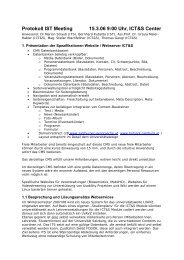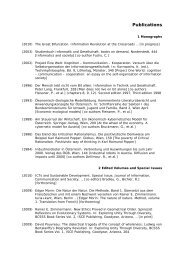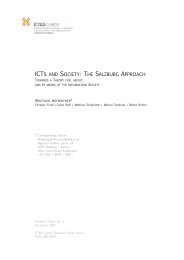CHRISTIAN FUCHS - ICT&S - Universität Salzburg
CHRISTIAN FUCHS - ICT&S - Universität Salzburg
CHRISTIAN FUCHS - ICT&S - Universität Salzburg
You also want an ePaper? Increase the reach of your titles
YUMPU automatically turns print PDFs into web optimized ePapers that Google loves.
Christian Fuchs: Social Networking Sites and the Surveillance Society3. A Critique of Approaches of Research about Integrated Social Networking Sites(ISNS)The task of this section is to give an overview of existing research about ISNS. It doesnot discuss all studies that have been undertaken, but categorizes research into threetypes and gives representative examples for each category:1. Techno-pessimistic ISNS research2. Techno-optimistic ISNS research3. Critical ISNS research3.1. Techo-pessimistic Research about Integrated Social Networking SitesThis category summarizes approaches that conclude that ISNS are dangerous and poseprimarily threats for the users, especially kids, adolescents, and more generally youngpeople. One can also characterize this approach as victimization discourse. Suchresearch concludes that ISNS pose threats that make users potential victims ofindividual criminals, such as in the case of cyberstalking, sexual harassment, threats bymentally ill persons, data theft, data fraud, etc. Frequently these studies also argue thatthe problem is a lack of individual responsibility and knowledge so that users putthemselves at risk by putting too much private information online and by not makinguse of privacy mechanisms, for example by making their profile visible for all otherusers.Two papers written by Alessandro Acquisti and Ralph Gross represent the ideal type ofthis kind of research.Acquisti and Gross conducted an online survey of ISNS users at Carnegie MellonUniversity (N=294, Acquist/Gross 2006) and data mining of 7000 ISNS profiles (Gross/Acquisti/Heinz 2005). Privacy policy was considered as a very important issue (averageof 5.411 points on a Likert-scale of 7). Users also showed a high concern about themisuse of personal information. The scholars did not find a direct relationship betweenthe intensity of privacy concerns and the likelihood of becoming a Facebook member.Users with higher privacy concerns would be less likely to join ISNS, but not in the caseof undergraduates.“Privacy concerns may drive older and senior college members away from FB.Even high privacy concerns, however, are not driving undergraduate studentsaway from it. Non-members have higher generic privacy concerns than FBmembers“ (Acquisti and Gross 2006: 47). Those users who join the networkwould not be more likely to exclude personal information from visibility if theyhave high privacy concerns. “We detected little or no relation betweenparticipants’ reported privacy attitudes and their likelihood of providing certaininformation, even when controlling, separately, for male and female members“(Acquisti and Gross 2006: 50).The majority of respondents were badly informed about Facebook’s privacy policy andfor which purposes their data are used.11









